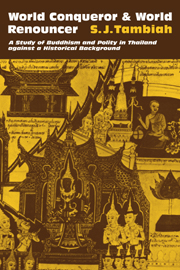 World Conqueror and World Renouncer
World Conqueror and World Renouncer Published online by Cambridge University Press: 10 November 2010
We shall now focus on the Ayutthayan kingdom in order to elaborate further a few critical features that we have come to associate with the galactic polity. Ayutthaya, by virtue of its larger magnitude when compared with Sukhodaya and its alleged utilization of political concepts and blueprints of Cambodian origin, contributes more complex features to the structure and form of the galactic polity than did Sukhodaya.
Wales' account (1934) of Siamese government and administration – centered primarily on Ayutthaya – rests on the historical supposition that it was during the rule of King Paramatrailokanatha (1448–1488) that a “great metamorphosis” in the system of government was achieved: A new system of ranking and administrative organization was introduced as a result of Khmer influence, and the conversion of “feudal nobles into government officials took place” (p. 33). Wales emphasizes that the reforms were made possible “by the influx of Khmer officials and literati after the sack of Angkor Thom by King Paramaraja in a.d. 1431” (p. 70).
While we can accept that Ayutthayan administration and political conceptions show an elaboration in the second half of the fifteenth century (as evidenced by the Palatine Law of 1458 and the Laws of Civil and Military Hierarchy of 1454), we should not think that Khmer influence suddenly flooded Ayutthaya for the first time with the conquest of Angkor. Khmer influence was a longstanding and deep-seated one in the whole region from pre-Sukhodaya and pre-Ayutthaya times, the local kingdoms having themselves been at various times Khmer provinces.
To save this book to your Kindle, first ensure [email protected] is added to your Approved Personal Document E-mail List under your Personal Document Settings on the Manage Your Content and Devices page of your Amazon account. Then enter the ‘name’ part of your Kindle email address below. Find out more about saving to your Kindle.
Note you can select to save to either the @free.kindle.com or @kindle.com variations. ‘@free.kindle.com’ emails are free but can only be saved to your device when it is connected to wi-fi. ‘@kindle.com’ emails can be delivered even when you are not connected to wi-fi, but note that service fees apply.
Find out more about the Kindle Personal Document Service.
To save content items to your account, please confirm that you agree to abide by our usage policies. If this is the first time you use this feature, you will be asked to authorise Cambridge Core to connect with your account. Find out more about saving content to Dropbox.
To save content items to your account, please confirm that you agree to abide by our usage policies. If this is the first time you use this feature, you will be asked to authorise Cambridge Core to connect with your account. Find out more about saving content to Google Drive.